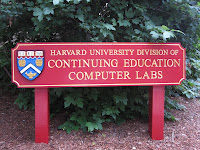Hearing from one of the foremost experts on higher education leadership and transitions, the IEM group was fully engaged. No small task as the group starts to get weary from the heavy schedule. Judy McLaughlin took the group through the paces of what occurs and the dangers in leadership transitions. From the perspective of the Board, staff, and new leadership the potential dangers that can derail an organization are everywhere. Lots to consider no matter where in an organization the transition is taking place.
Reflecting on the conversation today, I recalled my 'transition' to SPCC from ECC. Clearly there were mistakes and things I could have done differently. I was a bit relieved to discover I was on the right path in a few areas. As we were advised at the outset, this is our opportunity to be the Learner. Definitely learned a few things today.
The Heifetz book, Leadership on the Line continues to ring in my ear. The work is laced with adaptive challenges masked in a cloud of what looks technical.
The question can be framed: is this a problem that an expert can fix (call a mechanic to fix my car, call the chiropractor to adjust my back)? These are technical problems. On the other side, is this a problem that is going to require people in the community to change their values, their behavior, or their attitudes? For this problem to be solved, are people going to need to learn new ways of doing business? (to address the drug problem we'll need to address the needs of parents, school counselors, the addiction/social service network, medical community, etc...). These are adaptive challenges that require a different kind of leadership behavior.
This afternoon we heard from the President of the MA College of Art and Design and the Dean of the Graduate School of Education. The Ed School Dean operates much like a typical President as at HU they operate under the motto 'every tub on its own bottom'. All the various colleges operate independently. An interesting and successful model but not without its problems to be sure.
Finished the day with a short, after hours demonstration of mind-mapping software. A way of crafting thoughts in a manner that is not linear like an outline but more in keeping with the way we actually think. They are exploring how they can use the software to do case teaching in the virtual environment and more importantly get students to return to the maps to compare, contrast others' maps and explore/reflect on their own position to see if they may adjust or change based on the conversation and the mind-maps of others. A richer, deeper level of learning. I downloaded the software and built a very simple map. Lots of possibilities for conversation and exploration of issues.
 |
Mind Map
|





















